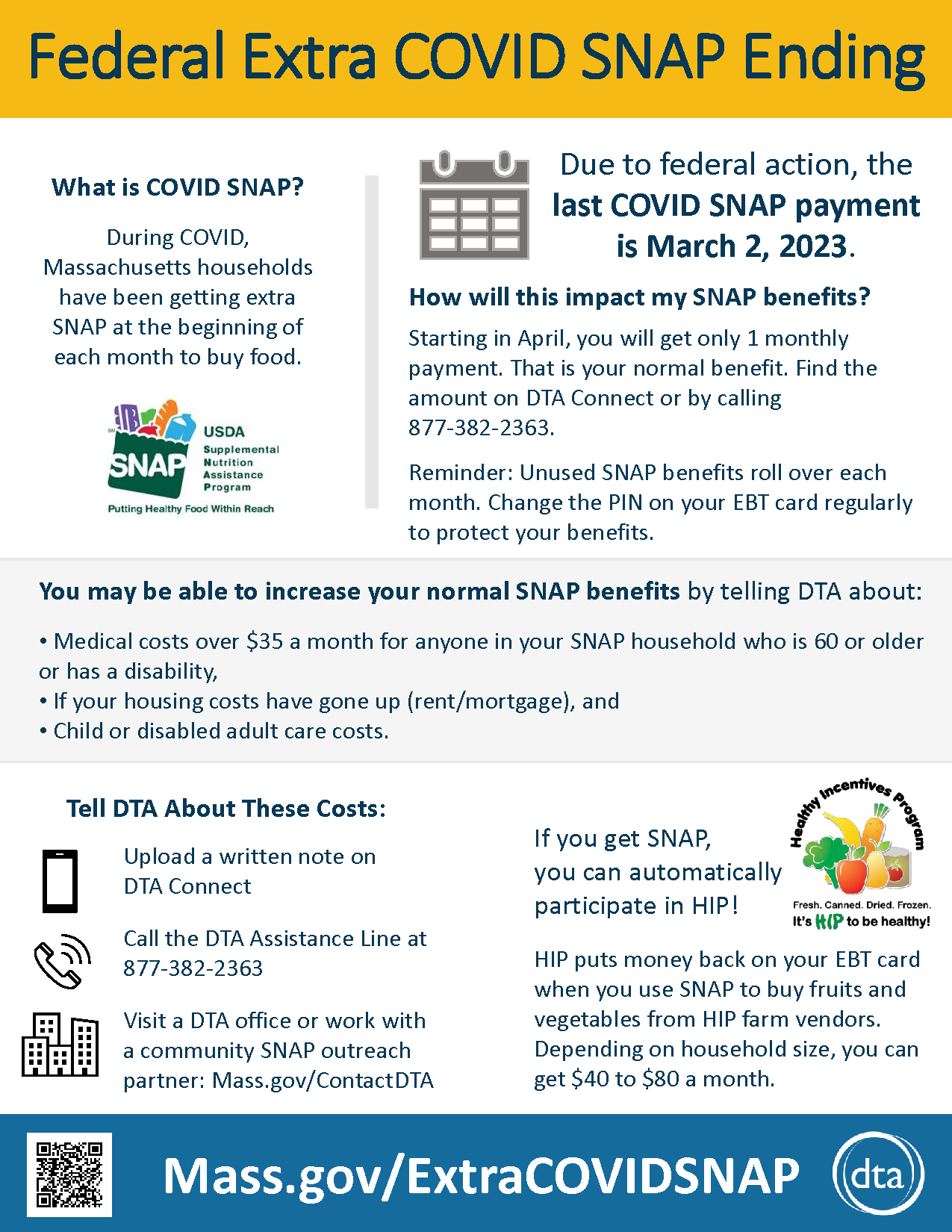Supporting Households as Federal Extra COVID SNAP Benefits Ends
Written by Jessika Brenin, Public Health & Food Systems Planner II, and Heidi Stucker, AICP, Assistant Director of Public Health
During the COVID-19 pandemic, households in Massachusetts enrolled in the Supplemental Nutrition Assistance Program (SNAP) were receiving extra, temporary benefits, known as SNAP Emergency Allotments. However, the recently passed Congressional Consolidated Appropriations Act, 2023 ended the SNAP Emergency Allotments, and households received their last “extra” payment on March 2.
As the cost of food has steadily increased over the past few years, food budgets are stretched thin. For people who are food insecure, a decrease in benefits may cause serious harm to people’s right to access food. The SNAP Emergency Allotments allowed households to receive the maximum SNAP benefit amount for their household size, with a minimum benefit amount of $95 a month.
How much the SNAP benefits decreased varies by household, but the losses are significant. Data from the Massachusetts Department of Transitional Assistance (DTA) shows that with the loss of SNAP Emergency Allotments, the average benefit amount for all SNAP households in the state decreased by 33 percent (from $480 to $323). SNAP households with earned income experienced the greatest loss in monthly benefits with an average decrease of 44 percent (from $643 to $394). Municipalities can see how their city/town is directly affected by viewing this town-by-town breakdown.
Municipal leaders need to ensure that vulnerable people in their communities know how they can maximize their SNAP benefits. Residents should be urged to see if they are eligible for food assistance and sign up for SNAP through DTA if they have not already. SNAP benefit amounts depend on a variety of factors, and SNAP recipients can report new circumstances to the DTA by calling (877) 382-2363. For example, if medical costs or childcare costs increased for a household, or if rent was raised, this information should be reported to the DTA because it may result in a larger monthly SNAP benefit. Residents can also call Project Bread’s FoodSource Hotline at 1-800-645-8333 to find out about more food programs in their area.
Municipal leaders and partners can support food insecure residents in receiving their maximum SNAP benefit by spreading the word using this DTA-published communications toolkit. The toolkit includes flyers, text and graphics for social media, and sample emails, robocalls, and text messages; it should be shared widely across communities. Municipalities can also support mutual aid networks and food access efforts such as community gardens, food pantries, and mobile markets.
A flyer from the DTA-published communications toolkit. Click to view full size.
In January, Governor Healey filed a FY23 Supplemental Budget to address critical needs including food access in the Commonwealth. It proposed $130 million to provide SNAP recipients with 40 percent of what their SNAP Emergency Allotment was to ease the transition. It also proposed $65 million for universal school meals, which would lessen food costs for families with children. The Supplemental Budget was taken up, combined with other provisions, and passed by the House of Representatives as H.58. Last week, the Senate passed their version of this bill, S.24. The House and Senate versions of the Supplemental Budget include the full funding for SNAP and for school meals as originally proposed. The legislation is currently being negotiated between branches. MAPC is advocating with legislators to include these critical items in this legislation and to make permanent food security programs.
In the long term, the state needs to continue to move towards ensuring all people’s right to nutritious and culturally affirming food. Food access is threatened by environmental and wealth inequities arising from historical and current practices of discrimination and exploitation. Municipalities can prioritize and commit to making equitable progress on the foundational determinants of food access by supporting:
- neighborhood environments with access to food retail that is healthy, affordable, and culturally affirming; community agriculture; and transportation access to food sources;
- affordable and stable housing;
- and living wages, worker protections, financial literacy, and community economic development.
Individuals can find more information about SNAP and check eligibility by visiting mass.gov/snap-benefits-formerly-food-stamps.
To learn more about how the Metropolitan Area Planning Council can support your community's food system planning, visit mapc.org/healthy-food-access or contact Heidi Stucker at hstucker@mapc.org or Jessika Brenin at jbrenin@mapc.org.

